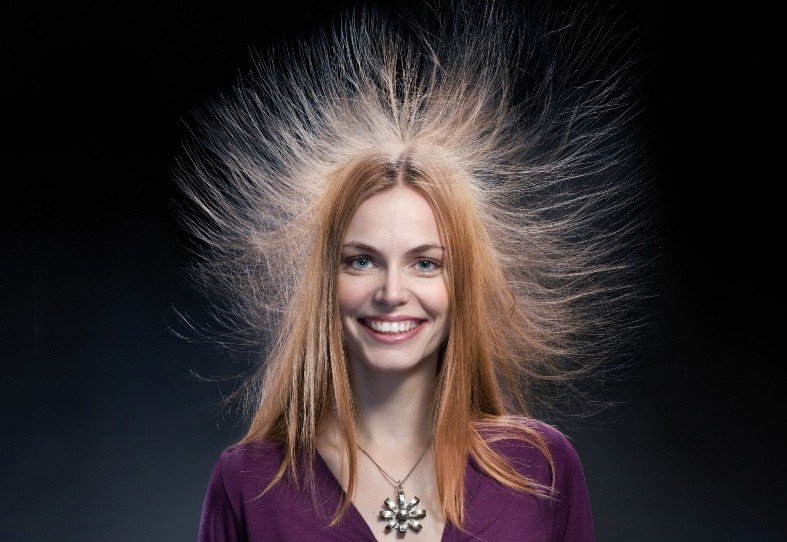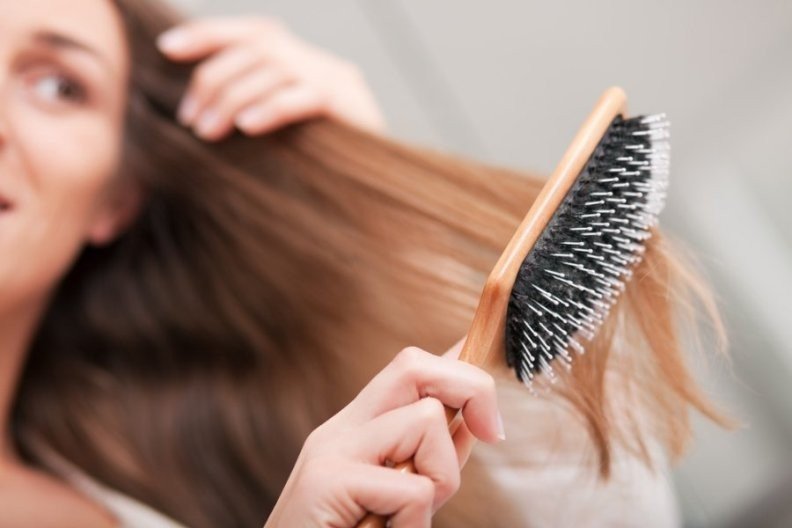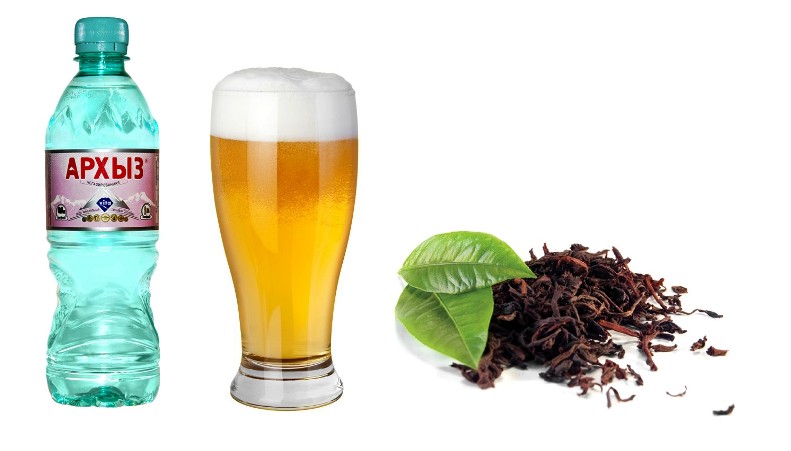The beauty of hair and the law of universal repulsion

What to do so that the hair is not electrified? If we turn to a school physics course, we can recall that charges of the same name repel each other, and oppositely charged ones, on the contrary, attract. This property explains many phenomena in our lives, including the electrification of hair, which can ruin the hairstyle and turn the head into a kind of dandelion. The fact is that electrified hair, taking a positive charge, begin to repel each other.
Why does hair get electrified?
Why is hair electrified and magnetized, what external causes affect this? Most often, dry damaged hair is electrolyzed. The most common reasons for this are:
- dyeing and perm;
- cold weather, wind;
- artificial heating in winter, which makes the indoor air very dry;
- use of a hair dryer;
- dehydration of body tissues;
- lack of vitamins.
Dry hair has a broken structure, in which the microscopic scales of each hair move away from the hair shaft. In healthy hair, they are tightly pressed against each other and the hair does not take on a large positive charge. Why else can electrification be observed?
Hair is strongly magnetized and electrified as a result of wearing hats, synthetic clothing, and using plastic combs.

What to do first?
Hair electrified
“Most often, hair is electrified in the winter. Synthetic fabrics, dry air from radiators and improper hair care only exacerbate the situation. The use of an antistatic agent for clothes, the use of moisturizing hair masks and the constant use of conditioner after shampooing effectively help. I also advise you to refuse hairspray, as it further contributes to their dryness.
Evgenia Semyonova
So that the hair is not strongly electrified, at home it is necessary to make special masks with folk remedies, but this will be discussed a little lower. To get started, check out what you need to do first:
- change the comb, preferring materials such as wood and natural bristles, birch combs are considered good;
- minimize the use of irons and hair dryers, it is very harmful;
- put synthetic clothes away in the closet, clothes made from natural fabrics do not cause the hair to become electrified and magnetized;
- if you choose care products, then pay attention to the composition - panthenol, ceramides and silicone help eliminate electrification;
- always use conditioner after washing your hair;
- drink enough water to avoid dehydration;
- it is useful to regularly make masks containing folk remedies - they restore the structure of each hair, and the hair is less electrified.
In general, the choice of how to deal with hair electrification depends on why it appears, and if the cause is dehydration, then you just need to increase the amount of water consumed daily. To understand why your hair is magnetized, analyze your diet, lifestyle, and evaluate the level of cosmetic care.

Quick Ways
What to do if the strands are strongly electrified, flying in all directions, at the most inopportune moment? In such cases, it is recommended to wet your palms with mineral water and smooth the raging charged hair. By the way, this method is effective and allows you to ensure that the hair is not magnetized for at least half a day. There is also a method according to which you need to lubricate the palms with a small amount of cream and also smooth the curls.
If you don't really like these products, then get a bottle of antistatic, for example, "Nutri Protex" from Oriflame or "Daily Shine" from Avon. These products are very effective and are designed specifically for hair.
Homemade Natural Ways
What to do so that the strands are not electrified? There are many recipes and at home, folk remedies, the most common products, come to the rescue. For example, the same mineral water, why not? She needs to sprinkle curls after washing her hair, and for greater efficiency, add essential oils of lavender, eucalyptus or rose to it, 3-4 drops each. These oils are very good natural antistatic agents, they can be dissolved in ordinary water and also sprinkled on hair so that they do not electrolyze. The following are the most effective remedies for electrifying hair.
If the strands are magnetized too strongly, try rinsing your head with mineral water, but not carbonated, this method also tones the skin and improves its blood supply.
You can rinse with the addition of lemon juice or beer to the water, as well as strong brewed tea - 300 ml of tea per liter of water.

Masks with yolk are considered a very good remedy, if the strands are electrified, try three recipes:
- mix 1 table. l. honey, olive oil with one yolk, then add 5 drops of lavender oil to the mask and apply on the head before washing for 30-35 minutes;
- combine two yolks, the contents of three vitamin A capsules, 2 teaspoons of honey and the same amount of almond, burdock or olive oil;
- the pulp of one mango, the yolk and 100 ml of kefir should be mixed and wrapped three times a week, after washing off, use the conditioner.
To prevent hair from becoming electrified, practice a mask of dry mustard diluted in water and honey, just do not forget to test for allergies on the elbow. Keep the mixture for up to an hour, if you can’t because of a burning sensation, then limit yourself to 30 minutes. If the strands are magnetic, then you can try a mask made from ordinary bread gruel made with water or warm milk.
A mask of 30 ml of olive oil and 4-5 drops of rosemary essential essence is also useful in this regard. The last ingredient can be replaced with lemon juice, these tools will help ensure that the hair is not electrified. The sight of a fluffy dandelion on your head is not terrible for you, because now you know a lot about what to do if your hair is electrified.
Professional skills: Chief physician of the medical center, practicing cosmetologist.
Brief biography and personal achievements: Teaching activity: teaching the subject "Social medicine and Health Organization", including for foreign (English-speaking) students, conducting consultations and pre-examination preparation.
Scientific and research activities: writing scientific publications, accompanying documents, organizing the interaction of the department with specialized leading clinical and cosmetology centers for joint research work, participation in conferences, symposiums, etc.
